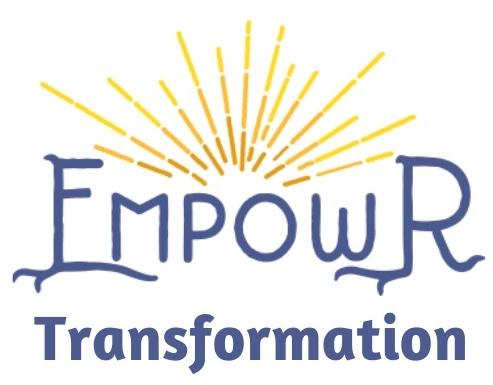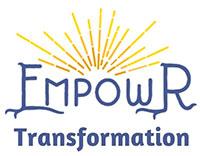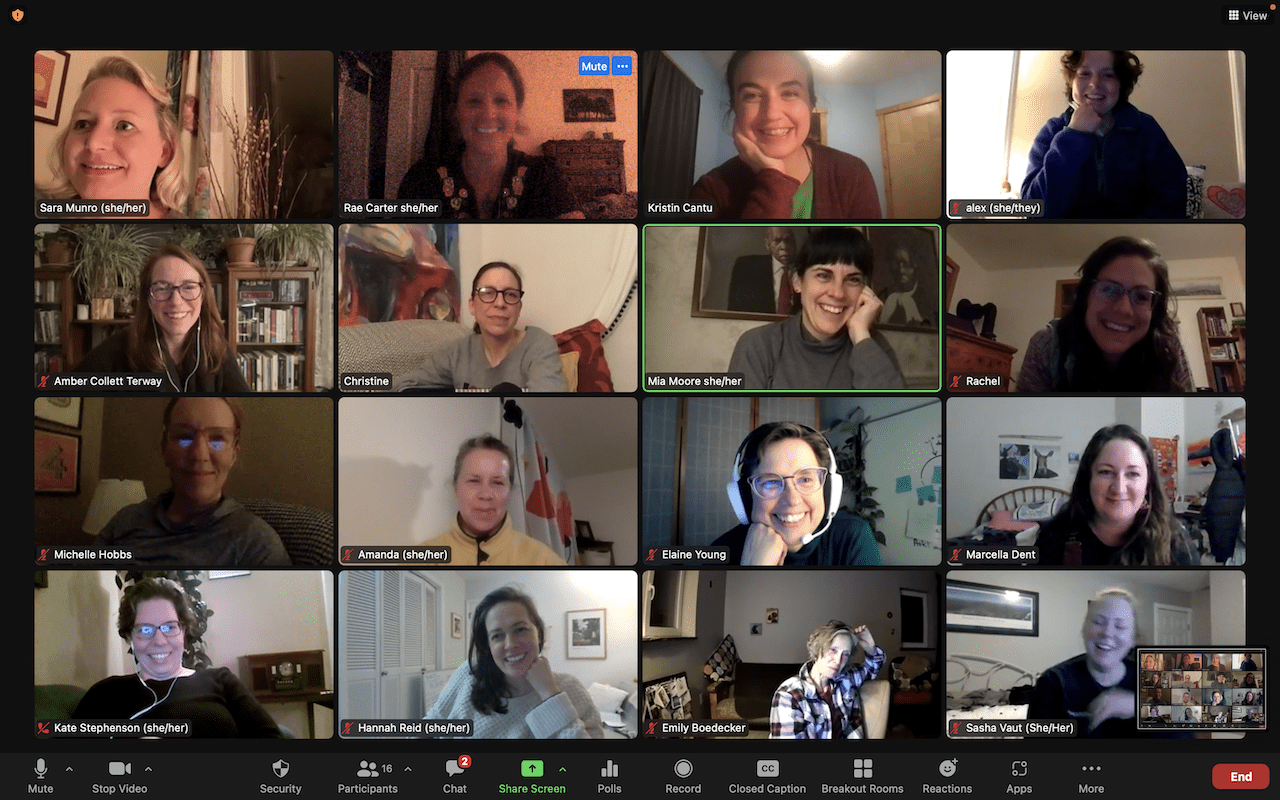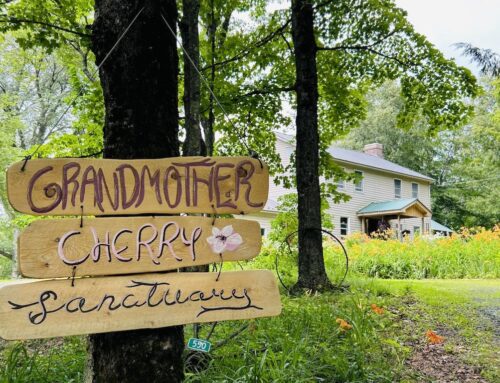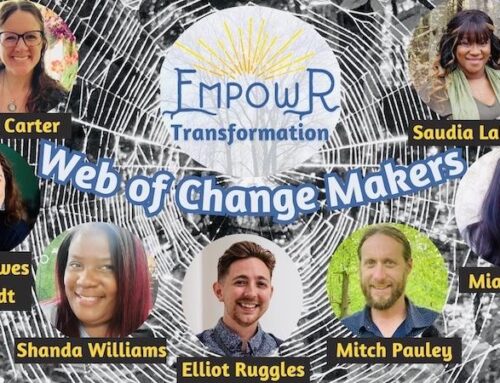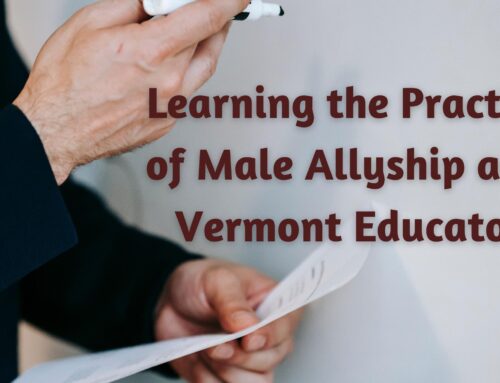The Accountability in Anti-Racism program was originally offered in the winter of 2022 to white identifying women in Vermont. This blog post aims to share intentions, context, and impacts of the pilot program.
“We’ve tried to teach our brains to think better about race.
But white body supremacy doesn’t live in our thinking brains.
It lives in our bodies.”
Resmaa Menakem, author of My Grandmother’s Hands and The Quaking of America
“Being quiet is comfortable.
Keeping things the way they’ve been is comfortable and all comfort has done is maintain the status quo.
So we’ve got to get comfortable with being uncomfortable to speaking these hard truths when they’re necessary.
It is our responsibility, our duty to speak truth to power, not only when it’s difficult, but especially when it’s difficult.”
Luvvie Ajayi Jones, speaker, author, and professional troublemaker from her TED Talk “Get Uncomfortable with Being Uncomfortable”
Throughout history to present day, an elemental facet to the disease of racism is white bodies controlling Black and Brown bodies, causing harm, trauma, terror, and death. For white bodies, there has been a cultural conditioning to disengage from race, to see it as something that is a problem only for People of Color. Being racialized in the dominant cultural norms of whiteness has desensitized people who identify as white to the horrors of racism and colonialism. Desensitization to this trauma sharply contributes to the lack of emotion and empathy that is characteristic of white dominant culture.
The emotional charge of race is paralyzing for many white bodies. Centering the comfort of white people is foundational in white dominant/supremacy culture.
As Resmaa Menakem explains in somatic abolitionism work through the Education for Racial Equity, white bodies’ reactions to dialogues about race include:
- Responding in anger, refusal, ignorance, crying, removing ourselves physically from situations;
- Turning it into an intellectual argument;
- Thinking it doesn’t apply to us because we are an ally and that we don’t need to do the personal awareness, responsibility, and embodied anti-racism work.
Seeing and participating in these reactions in attempts at anti-racism work provided groundwork for the creation of the Accountability in Anti-Racism program.
Accountability in Anti-Racism was designed as an unlearning and relearning experience by and for white identifying people. By practicing ways to be fully present in our bodies, and in community together, we invite new cultural norms for how white bodies can dialogue about race. By enabling ourselves to move through the emotional charge of race, we are able to speak and act in ways that support the racial justice movement. When we can learn how to truly be in loving community with each other, as white people, we learn how to create inclusive spaces and can emerge into multiracial spaces without causing harm.
“White Americans who seek to undo white-body supremacy have organizations; they have ideas and strategies and goals; they have initiatives; and they have energy, conviction, and hope. But they have little sense of community–and no culture to build and support such community.
This needs to change…
When white Americans build culture that is sane and loving, they will no longer feel a need to exclude people of color from it.
Ultimately, whiteness must transform race to culture.
Once this has been achieved, it can begin to transform from culture into (multiracial) community.”
– Resmaa Menakem
BACKGROUND
The idea for the Accountability in Anti-Racism program sparked in early 2021 in response to growing interest for a deeper commitment towards racial justice by the ElevateHer Vermont community–a Central Vermont network of women entrepreneurs. Facilitators Mia Moore of Mia Moore Consulting and Rae Carter of EmpowR volunteered to initiate a co-creation process to explore how to approach and structure anti-racism conversations with a primarily white-identifying community. Several members of the community also stepped forward to support the creation of an effort to look at the institutional, structural, cultural, and personal expressions of racism.
Given that personal bias and behaviors are what inform culture and systems, the group focused on how to create a container for white women in the broader ElevateHer community to move beyond our own fragility, exceptionalism, saviorism, and comfort in anti-racism work.
The program focused on three primary areas:
- Relationship Building and Vulnerability
- Internal Examination and Personal Responsibility
- Making Commitments and Accountability.
An in depth syllabus of materials, representing many perspectives and resources by People of Color and some by white people in personal accountability work, was developed to consider how to shape the conversations. The Circle Way was introduced as a model for equitable dialogue facilitation (recommended by Layla F. Saad, author of Me and White Supremacy, as a model to use in anti-racism discussion groups). The group worked with somatic, embodiment, and emotional agility practices from My Grandmother’s Hands, helping to shape the container to invite messiness, spaciousness, and growth to build stamina around the emotional charge of race.
The facilitation team learned very quickly how working with two tenets of anti-racism–equitable communication practices and including all participating voices in shaping a program–takes much more time, patience, flexibility, listening, and trust than the ‘professionalism,’ ‘efficiency,’ and ‘transactional relationships’ white supremacy culture allows. Co-creating the program was a pilot in and of itself, with the design team giving themselves the space to unlearn and relearn in the process.
Almost a year after the idea surfaced, Accountability in Anti-Racism launched as a collaborative effort between Mia Moore Consulting, EmpowR, and ElevateHer Vermont with support from the Vermont Women’s Fund and reparations offered to the Vermont Professionals of Color Network. Mia and Rae led the program facilitation with convening support from design team members, Kristin Cantu of Well Told Films and Kate Stephenson of HELM Construction Solutions.
Twenty-four women registered for the program and half continued through until the end. This speaks to the discomfort of different approaches to racism, capacity challenges to engage in anti-racism work, personal and family needs and health, and the struggles we are facing as the systems break.
PROGRAM PARTICIPATION AND ACCOUNTABILITY
The Accountability in Anti-Racism program follows a root cause analysis trajectory towards transformation that gleaned from EmpowR’s accountability towards transformative justice and emergent strategy:
- Anti-racism work requires behavior change.
- White supremacy/dominant culture cannot change unless the people who make up that culture themselves change.
- Behavior change relies on personal reflection to understand our own personal transformation.
- Self examination and internal reflection is difficult and uncomfortable.
- Strengthening the discomfort muscle opens space for change.
“The program wasn’t what I expected and also completely blew me away. I think I finally understand what it means to need community in anti-racist work. I appreciated the focus on embodiment and the evolving structure SO much—how powerful. I literally felt in my body what it was like to not seek approval and take accountability for my words and my thoughts and decide for myself what I thought about them. And I felt it get “easier” to do that over the course of the program. I’m still processing the whole thing but I know that was a really really powerful experience and I’m better for it.” ~program participant
Program sessions deepened emotional agility through the facilitation process and approach. Discussion prompts focused on how the body responds to content and situations rather than holding intellectual discussions and debates. Each session centered embodiment practices to support the nervous system (a custom that is becoming more common in white dominant culture spaces navigating equity). Conversations were structured to invite discomfort and ask participants to simply be uncomfortable and notice what urges and behaviors arise. Mia and Rae offered context to how personal behaviors are expressions of racism in the white body and how individual behaviors generate group norms of white supremacy culture (see white supremacy cultural characteristics in Tema Okun’s work here).
“The dominant culture depends on the voice of judgment.”
bell hooks, Black feminist, activist, author (1952-2021)
Intentions of the Accountability in Anti-Racism program were for participants to realize how to disengage from the harmful behaviors and norms of white supremacy culture. By cultivating brave space through building relationships among the white-identifying participants who opted into these conversations, two tenets of racial justice work–slowing down and learning how to listen with empathy–were actualized.
Participants were asked to do the difficult work of letting go of judging (of others and of self) in the dialogues, so everyone could simply hear and witness each others’ lived experiences. Mia and Rae intentionally shared stories that revealed personal vulnerability, mistakes, and mess in anti-racism work, modeling the importance of getting white perfectionism and urgency OUT of the racial justice space. This deep, patient, intentional cultivation of prioritizing feeling (embodiment) over thinking (intellectualizing) is what ultimately allowed for transformation in each participant.
“I appreciate (though it was hard!) the discussions focused on how they made me feel rather than an intellectual debate on the merits of the resources.” ~program participant
“[Most valuable was] hearing from other women about the tension they feel and their perspectives on anti-racism work.” ~program participant
“The safety of this community to share with each other, be vulnerable, listen to and be heard without judgment.” ~program participant
Well-intentioned white folx who are just now coming to the realization of racism and our own racialization have become obsessed with what we can do to change things, to ‘make it better.’ While there are plenty of To Do and To Read lists available, what we don’t learn from those lists is how to unpack and remove harmful behaviors that get in our way of making change. We’re talking about behaviors that we have been socialized our entire lives to believe are ‘good’–fixing things, giving advice, coming up with a solution, rugged individualism, getting it ‘right’, making it better, keeping a positive attitude, being polite, being quiet, not ‘rocking the boat.’
Reading books, attending rallies, and going to diversity/equity/inclusion trainings does not equate to shifting away from these behaviors. Behavior change is incredibly difficult–it means breaking down who we are and how we move throughout the world. And it is necessary in order to create the conditions for real change, especially for white-identifying people to fully show up for racial justice.
“[Accountability for me looks like] making the conscious effort to cast off my own implicit role as facilitator [along with a BIPOC woman I am working on a project with] of our business meetings, and surrender to my discomfort of the unstructured format to which she is clearly more inclined.” ~ program participant
“[An accountability commitment I made is] to include my family in conversations about the culture of racism we exist in that, as a family, we can continue to build awareness of that culture and our white privilege and identify ways/opportunities to combat racism and support more open and equitable cultural norms and practices. Also to observe and check some of my own norms that support white supremacy culture – specifically my sense of urgency and my tendencies towards perfectionism, as well as reflecting on my values, where those values come from and to what extent they are rooted in white culture.” ~program participant
“In a personal situation with a BIPOC woman, I have discarded of my own expectations about scheduling, predictability of communication, etc., recognizing that her own [racialized] trauma (in associating with myself as a cis, white, landowning person) vastly supercedes my rigid needs/connotations for communication and planning.” ~ program participant
Accountability in Anti-Racism is now an EmpowR program offering, available in several formats as a co-creation process with organizations, businesses, municipalities, education institutions, diversity/equity/inclusion consultants, networks, and community members who seek to weave anti-racism work into daily life, behaviors, conversations, and commitments to build anti-racist culture.
Learn more here.
Program facilitators for the pilot Accountability in Anti-Racism program, Mia Moore of Mia Moore Consulting and Rae Carter of EmpowR both contributed to writing this blog post.
